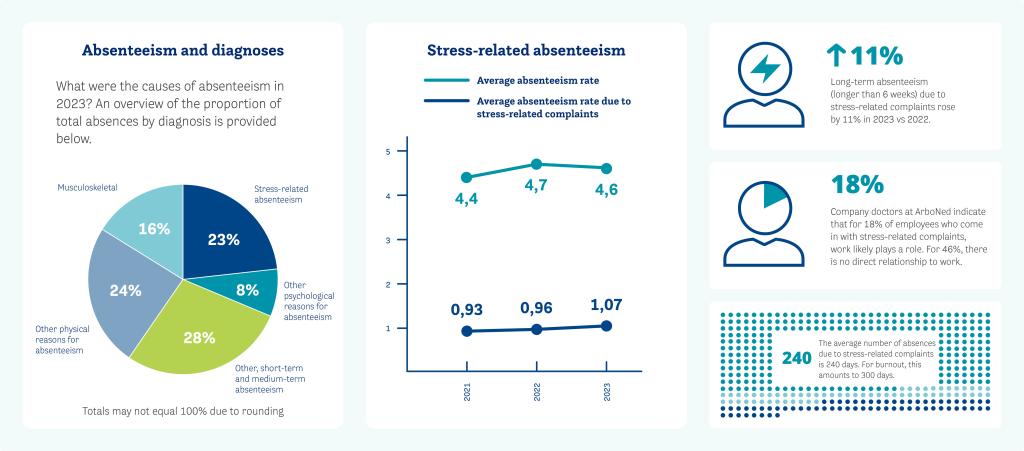Absenteeism due to stress increased last year

Stress-related absenteeism in 2023
The overall average absenteeism rate was slightly lower at 4.6% in 2023 compared to 4.7% in 2022. Almost a quarter of all absenteeism in 2023 was caused by absences due to diagnoses of stress, overexertion or burnout. Stress-related complaints are causing more and more people to stop being able to work for an extended time. Stress-related complaints prevent employees from working at full capacity for an average of 240 days. When it comes to burnout, this can get as high as 300 days. This has an impact on the employee on a personal level as well as on the company.
Preventing stress-related absenteeism
There is a major need for a systematic organisational approach to preventing stress-related absenteeism. If the signs of stress are ignored, the severity of the symptoms will often increase over time. This will also result in the duration of absenteeism increasing. “By investing in the early detection of risks and recognising the signs of stress, you can start the conversation earlier and prevent complaints from piling up,” emphasises Redmer van Wijngaarden, Company Doctor and Director of Medical Affairs at ArboNed. You first map out the risk factors at an organisational level with a risk inventory and evaluation (RI&E). After that, a preventive medical examination (PMO) provides insight into the physical and mental health of an employee. This then helps you look for solutions together at an early stage. Both the employee and the manager hold responsibility in this process.
Cause of stress-related complaints, relationship to work
Company doctors from ArboNed indicate that for 18% of employees who come in with stress-related complaints, work likely plays a role. For 46%, there is no direct relationship to work. Van Wijngaarden: “Even if the cause is personal, for example due to informal care, divorce or financial problems, it can still have an impact on work performance. And when someone stops being able to work, it creates additional pressure on their colleagues who then have to take over. So it is incredibly important to keep talking to each other, lend a listening ear and find a solution together. Giving employees enough space to take off time when needed can often make a huge difference to them.”
Notable differences
ArboNed and HumanCapitalCare see a few notable differences in absenteeism due to stress-related complaints between the various groups represented in the figures. In view of these differences, it is necessary to tailor solutions on an individual basis.
- In particular, employees between the ages of 25 and 45 stop being able to work due to stress-related complaints.
- Absenteeism due to stress-related complaints is highest in public administration, healthcare and education – about twice as high as in construction, where more physical complaints are reported.
- A relatively higher number of absences due to stress-related complaints are recorded among women (29% of all absences) than among men (19%), who have more musculoskeletal issues (bones, muscles, tendons, joints).
- Among part-timers, absenteeism is more often related to stress (26%) than among full-time workers (22%), although it is still the biggest cause of absenteeism even for this group.
- In companies with more than 250 employees, stress-related absenteeism is 20% higher than in smaller (SME) companies.
The right balance
“All sorts of factors come into play such as your own personality and the type of work you do,” Van Wijngaarden continues. “It is not always possible to influence external factors and employers have a responsibility to provide a safe and healthy working environment. But the way a person deals with certain events and the support that is in place determines whether and to what extent this will lead to stress symptoms that can lead to someone dropping out of work. Ultimately, it’s about finding the right balance and making the right choices. Knowing what gives someone energy and what consumes it, and providing enough autonomy, all contribute here."
Professional help
Employers and employees can work together to positively influence this balance and foster resilience. This can be done with professional support if necessary, for example by visiting the company doctor’s open consultation hour. The company doctor may in turn refer the employer to a psychologist or the company social worker. Van Wijngaarden: “In the mental health sector, we often see long waiting times. At ArboNed and HumanCapitalCare, in-house psychologists are part of the permanent team in the region. Employees can usually see our psychologists in as little as two weeks. One day of absenteeism costs an employer 315 euros on average. Investing in getting someone the right help quickly often pays off. We see that employers are increasingly becoming aware of this.”